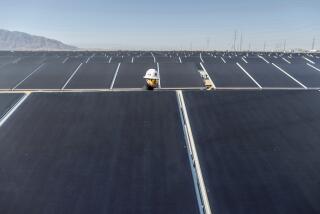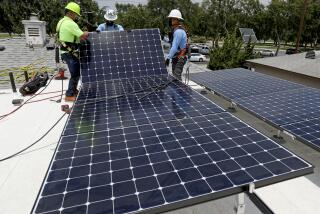No on Proposition 7
It’s rare to see an initiative attract the diversity of opposition that Proposition 7 has. We’re accustomed to measures that are opposed by either the Democratic or Republican parties, for example, but Proposition 7 has been rejected by both. Usually, when a pro-environment measure attracts the ire of the California Chamber of Commerce, as this one has, it’s supported by green groups -- yet in this case, many of the state’s most important environmental advocates, including the Union of Concerned Scientists, the Natural Resources Defense Council and the League of Conservation Voters, are against it.
Also on the list of prominent opponents are the state’s major utilities, renewable energy providers, key consumer groups, the California Taxpayers’ Assn. and the electrical workers union. In fact, just about the only people who seem to like the initiative are voters, who, according to initial polls, are strongly in favor. That’s probably because, at first glance, it looks terrific: It promises a huge increase in clean, renewable power without a significant increase in energy bills. It’s only when you delve deeper that you find the bugs.
Specifically, Proposition 7 would require utilities to get 20% of their power from renewable sources -- meaning solar, wind, geothermal, biomass and small hydroelectric generation -- by 2010. The state already has such a mandate in place, but it only applies to investor-owned utilities; under this measure, municipal utilities such as the L.A. Department of Water and Power also would be brought on board. The requirement bumps to 40% renewable power by 2020 and to 50% by 2025.
There is a suitcase full of devils in the details of Proposition 7. Among them, it gives new regulatory powers over the placement of transmission lines used by renewable generators to the California Energy Commission, without taking those same powers away from the Public Utilities Commission. This would lead to confusion, delays and probably lawsuits.
The measure also contains confusing language that seems to exclude small renewable plants that generate less than 30 megawatts from counting toward meeting the state’s clean-power goals. This is a problem because the transition to solar power is being led by businesses and homeowners, who increasingly are putting solar panels on their rooftops and selling small amounts of energy back to the utilities, while getting rebates for installing the systems. Some utilities, such as Southern California Edison, are also leasing rooftop space from corporations for large (though less than 30-megawatt) installations. If such projects don’t count toward meeting the state’s renewable-power goal, which would probably be the case under Proposition 7, there would no longer be any incentive for the utilities to pay for them. That’s why environmental groups are rightly appalled by this initiative, which could actually slow the growth of solar power.
Another frightening thing about Proposition 7 is that it locks its provisions in place and can only be changed with a two-thirds vote by the Legislature or another ballot measure. That would make it very difficult to fix unforeseen problems; if the transition to renewable power seriously damaged the state’s economy or led to widespread outages, as the attempt to deregulate the power industry in the late 1990s did, lawmakers would have to jump a high hurdle to set things right.
Proposition 7 is the brainchild of Arizona billionaires John and Peter Sperling. The father-and-son team joins a long list of wealthy political dilettantes, such as Rob Reiner and Stephen Bing, who in recent years have been foisting well-meaning but wrongheaded ballot measures on the people of California. Memo to the millionaires: Please stop.
Californians who are worried about global warming and the environment needn’t feel guilty about rejecting Proposition 7. Under a law passed two years ago, the state is on a path to cut its greenhouse gas emissions to 1990 levels by 2020. There’s broad agreement among policy-makers, including Gov. Arnold Schwarzenegger, that in order to reach this goal, the state must get 33% of its power from renewable sources by 2020. A bill that would have set the 33% renewable standard stalled this year in the Legislature, but given its powerful backing, there’s good reason to believe it will pass next year. That would be a much better approach, and we urge the Legislature to make this bill a priority in 2009. Voters, meanwhile, can do right by the environment by checking the “no” box on Proposition 7.
More to Read
A cure for the common opinion
Get thought-provoking perspectives with our weekly newsletter.
You may occasionally receive promotional content from the Los Angeles Times.






